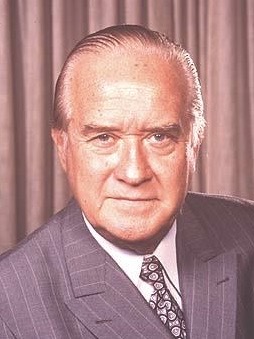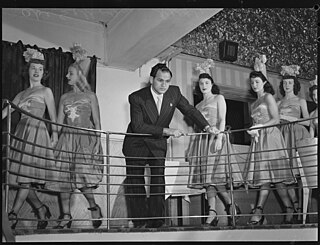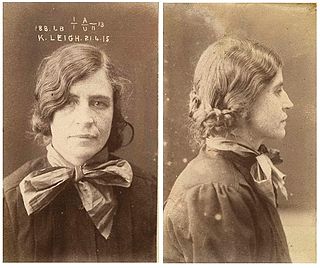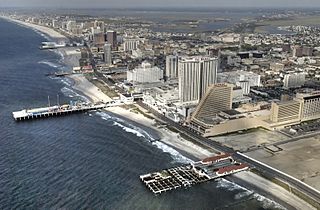
Sir Robert William Askin, GCMG, was an Australian politician and the 32nd Premier of New South Wales from 1965 to 1975, the first representing the Liberal Party. He was born in 1907 as Robin William Askin, but always disliked his first name and changed it by deed poll in 1971. Before being knighted in 1972, however, he was generally known as Bob Askin. Born in Sydney in 1907, Askin was educated at Sydney Technical High School. After serving as a bank officer and as a Sergeant in the Second World War, Askin joined the Liberal Party and was elected to the seat of Collaroy at the 1950 election.

A bookmaker, bookie, or turf accountant is an organization or a person that accepts and pays out bets on sporting and other events at agreed-upon odds.

Thoroughbred horse racing is a spectator sport in Australia, and gambling on horse races is a very popular pastime with A$14.3 billion wagered in 2009/10 with bookmakers and the Totalisator Agency Board (TAB). The two forms of Thoroughbred horseracing in Australia are flat racing, and races over fences or hurdles in Victoria and South Australia. Thoroughbred racing is the third most attended spectator sport in Australia, behind Australian rules football and rugby league, with almost two million admissions to 360 registered racecourses throughout Australia in 2009/10. Horseracing commenced soon after European settlement, and is now well-appointed with automatic totalizators, starting gates and photo finish cameras on nearly all Australian racecourses.

The National Thoroughbred Racing Association (NTRA) is a broad-based coalition of American horse racing interests consisting of leading thoroughbred racetracks, owners, breeders, trainers and affiliated horse racing associations, charged with increasing the popularity of horse racing and improving economic conditions for industry participants. The NTRA has offices in Lexington, Kentucky, and Rye Brook, New York.
Domenic "Mick" Gatto is a professional mediator within the Victorian building industry; and a debt collector. Gatto was named as a standover man during the Royal Commission into the Building and Construction Industry.
Gambling in the United Kingdom is regulated by the Gambling Commission on behalf of the government's Department for Digital, Culture, Media and Sport (DCMS) under the Gambling Act 2005. This Act of Parliament significantly updated the UK's gambling laws, including the introduction of a new structure of protections for children and vulnerable adults, as well as bringing the burgeoning Internet gaming sector within British regulation for the first time.

Abraham Gilbert Saffron was an Australian hotelier, nightclub owner, and property developer who was one of the major figures in organised crime in Australia in the latter half of the 20th century.

Kathleen Mary Josephine Leigh was an Australian underworld figure who rose to prominence as a madam, illegal trader of alcohol and cocaine, and for running betting/gambling syndicates from her home in Surry Hills, Sydney, Australia during the first half of the twentieth century. Leigh, known as the ‘Queen of Surry Hills’, was a sly groger and fence for stolen property.

The New South Wales Crime Commission is a statutory corporation of the Government of New South Wales. It is constituted by the Crime Commission Act 2012, the object of which is to reduce the incidence of organised crime and other serious crime in the state of New South Wales, Australia.
Organised Crime and Gangs in Australia refers to the activities of various groups of crime families, organised crime syndicates or underworld activities including drug trafficking, contract killing, racketeering and other crimes in Australia.

George David Freeman was an Australian bookmaker, racing identity and illegal casino operator. He was linked to the Sydney drug trade during the 1970s and 1980s, was named in several Royal Commissions into organised crime and had links with American crime figures. Freeman served several prison terms for theft between 1951 and 1968 but was never brought to trial for any of his later alleged crimes, receiving only monetary fines for SP bookmaking in the mid-1980s. Freeman survived a murder attempt in 1979, was married twice, published an autobiography and died in 1990 of heart failure related to asthma and pethidine addiction.
Gambling in Pennsylvania includes casino gambling, the Pennsylvania Lottery, horse racing, bingo, and small games of chance conducted by nonprofit organizations and taverns under limited circumstances. Although casino gaming has been legal for less than two decades, Pennsylvania is second only to Nevada in commercial casino revenues.
Zeljko Ranogajec is a businessman and professional gambler from Australia. The London-based Ranogajec is known for horse betting, blackjack and other forms of advantage gambling.

Gambling in New Jersey includes casino gambling in Atlantic City, the New Jersey Lottery, horse racing, off-track betting, charity gambling, amusement games, and social gambling. New Jersey's gambling laws are among the least restrictive in the United States. In 2013, the state began to allow in-state online gambling. Five years later, the state won a lawsuit that dismantled Nevada's monopoly on legal sports betting.
The Costigan Commission was an Australian royal commission held in the 1980s.
Robert Godier Bottom,, better known as Bob Bottom, is a retired Australian investigative journalist and author.
Kathryn Anne McClymont is a journalist who writes for The Sydney Morning Herald. Notable for exposing corruption in politics, trade unions, sport, and horse racing, she has received death threats because of her exposés. She has won many awards for her reporting, including the 2002 Gold Walkley Award for her work on the Canterbury Bulldogs salary cap breaches. She is best known for her series of articles and book about New South Wales Labor Party politician Eddie Obeid.

Betting on horse racing or horse betting commonly occurs at many horse races. Modern horse betting started in Great Britain in the early 1600s during the reign of King James I. Gamblers can stake money on the final placement of the horses taking part in a race. Gambling on horses is, however, prohibited at some racetracks. For example, because of a law passed in 1951, betting is illegal in Springdale Race Course, home of the nationally renowned Toronto-Dominion Bank Carolina Cup and Colonial Cup Steeplechase in Camden, South Carolina.
The history of gambling in the United Kingdom goes back centuries, as do efforts to deplore it, and regulate it.

Jordan Shanks-Markovina, also known online as friendlyjordies, is an Australian political commentator, journalist, stand-up comedian and YouTuber. His content often discusses contemporary Australian cultural and political issues, involving self-described "lowbrow humour." Shanks' YouTube channel, created in February 2013, has over one million subscribers as of March 2024. He has interviewed several politicians, including Jodi McKay, Tanya Plibersek, Kristina Keneally, Bill Shorten, Helen Dalton, and former prime minister Kevin Rudd.










